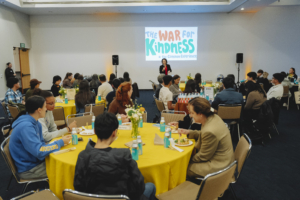Jamil Zaki, author of The War for Kindness, visits UCLA
By Dialogue Across Difference Student Interns
By Dialogue Across Difference Student Interns
On March 4th, the UCLA Bedari Kindness Institute (BKI) , the Dialogue Across Difference (DaD) Initiative, the Common Experience at UCLA, and UCLA Alumni welcomed Professor Jamil Zaki, author of The War for Kindness and director of the Stanford Social Neuroscience Lab, to UCLA. Faculty, students, staff, alumni, and members of the public participated in a three-part series centered around Zaki’s work. This series included an author’s roundtable with UCLA faculty and other community members, a larger public lecture and discussion that were part of the ongoing “Compassionate Conversations” series, and a post-lecture dinner program with students and alumni.
Jamil Zaki’s The War for Kindness was the book selected this academic year by the Common Experience at UCLA, which is a first-year program designed to bring Bruins together through shared experiences and reading. BKI and DaD were delighted to join with the exceptional Common Experience and UCLA Alumni teams in the latest installment of the “Compassionate Conversations” series, which features speakers who share a deep commitment to engaging others with compassion, empathy, and respect. The following is a summary of his visit to campus.
Dr. Zaki’s first appearance at UCLA was with a group of UCLA faculty, staff, students, and alumni for a discussion about kindness and empathy in polarizing times. Faculty from a range of departments, including Sociology, the David Geffen School of Medicine, Writing Programs, Public Health, and Anthropology were present, in addition to members from the DaD Faculty Fellows program.
The event was led by Maia Ferdman, Deputy Director at the Bedari Kindness Institute, who opened the conversation by asking each participant to share how they experience kindness and compassion in their work on campus and in the classroom. Jamil Zaki then reflected back on the responses by asking, “How do we build empathy in a time of conflict? What is the goal beyond empathy?” Zaki drew on his own research through the Neuroscience Lab and within the Stanford University community to demonstrate one key point clearly: that the picture we have in our mind of systematic distrust is not real. We tend to believe that people are more hostile, more aggressive, and more irrational than reality. Zaki says this is a misperception: “we perceive the danger [of engaging with others] to be greater than it is. When we actually engage in dialogue, we tend to agree! What can be done about this?
Zaki left the roundtable participants with several key takeaways:
After the roundtable, an open event was held on The Hill for all UCLA students and community members. Zaki began by giving a presentation on his book, empathy, and kindness. He started by introducing anthropologist Margaret Mead and posed the question: what do people leave behind to show they weren’t just a group, but a culture? He referenced the first healed thigh bone (femur) as a symbol of empathy—a sign that humans cared for one another and supported those who were injured. This, he explained, was one of the earliest representations of compassion in human history.
Following his presentation, Zaki was joined in conversation by UCLA historian David Myers, Director of the Bedari Kindness Institute. Professor Myers opened the discussion by asking Zaki, “Are you a social psychologist or a social engineer?” When asked about the challenges of translating empathy into action, Zaki offered an honest reflection: “Many worthwhile things are very hard to do.” He explained that when studying empathy on campus, he’s found students are far more empathetic—and far more willing to help one another—than they often realize. One way he and his team encourage action within their own community is by presenting data collected from Stanford students back to those same students, helping them recognize their own capacity for care and connection.
The conversation then turned toward generative AI and its role in fostering, promoting, and displaying empathy. While he acknowledged AI’s potential to work constructively in enhancing empathy, he emphasized the need to be cautious of how society utilizes technology, given its profound emotional and social impacts.
Finally, Professor Myers asked, “Do you believe in the goodness of the human condition?” Zaki flipped the question, suggesting that rather than focusing on whether inherent goodness exists, we should pay attention to the malleability of the human condition. Depending on what people are exposed to, they can become more or less empathetic. Under the right conditions, empathy can be cultivated and strengthened in everyone.

The evening ended with a Dinner Dialogue that brought together different members of the UCLA community, including students and alumni, to process what they had learned from Dr. Zaki in an informal and intimate setting. Students, alumni, community members, faculty, and staff served themselves food before settling in to reflect on the day’s conversations.
“What is a moment of kindness you experienced at UCLA?”, was the question that launched the discussion. Guests took turns sharing stories and experiences of kindness that impacted their lives. Many commented on how kindness first showed itself during a moment of deep hurt or pain. For some, the acts of kindness that they shared were small – a check-in from a friend, a hug, or even just being present in silence. These small acts evoked powerful recollections of being seen, supported, and cared for. The impact of the long day with Jamil Zaki and his work lingered as participants exchanged numbers, shared stories, and built new connections.

 Parents Circle – Families Forum
Parents Circle – Families Forum